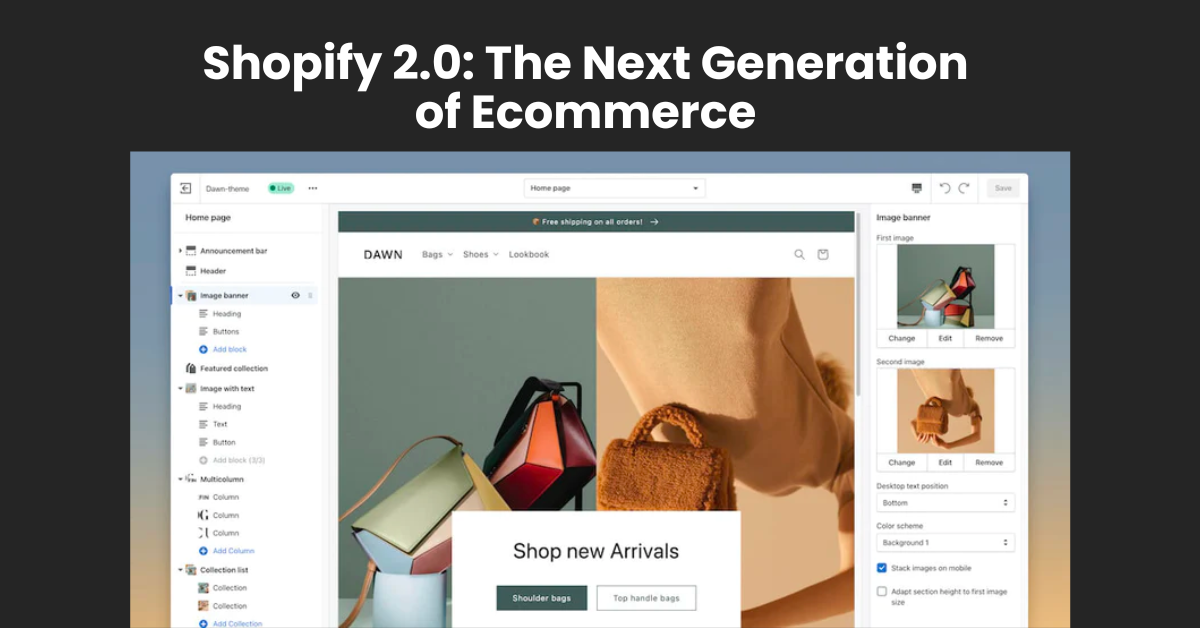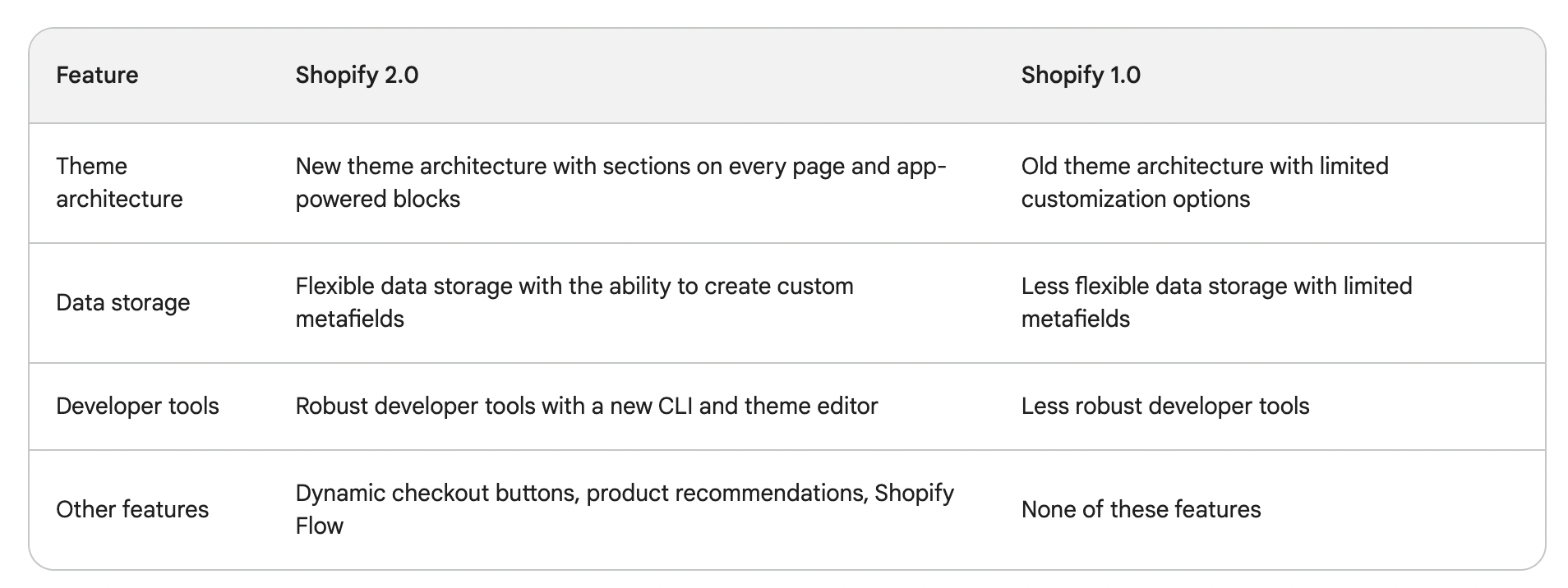Shopify 2.0: The Next Generation of Ecommerce

Shopify 2.0 is the next generation of ecommerce, and it's here to revolutionize the way we shop, sell, and connect online. With its focus on flexibility, customization, and extensibility, Shopify 2.0 gives businesses of all sizes the tools they need to create a seamless and user-centric shopping experience.
In this blog post, we'll take a look at some of the key features and benefits of Shopify 2.0, and how it can help you take your ecommerce business to the next level.
What is Shopify 2.0

Shopify 2.0 is a major update to the Shopify ecommerce platform that was released in 2021. It's designed to give merchants more flexibility and control over their online stores, with a focus on customization, extensibility, and performance.
Shopify 2.0 features
Here are some of the key features of Shopify 2.0:
- Sections on every page: Sections allow you to easily add, remove, and rearrange content on any page in your store, without having to write any code. This makes it easy to create a custom and engaging shopping experience for your customers.
- App-powered blocks: App-powered blocks allow you to add new features and functionality to your store from a variety of third-party apps, without having to install a separate app for each feature. This makes it easy to create a custom and feature-rich shopping experience for your customers, without having to manage a complex stack of apps.
- Flexible data storage: Shopify 2.0 gives you more control over how your data is stored and managed. This makes it easier to create custom integrations and workflows.
- Robust developer tools: Shopify 2.0 includes a suite of new developer tools that make it easier to build and maintain themes and apps. This makes it easier to create a custom and unique shopping experience for your customers, without having to rely on a developer.
- Dynamic checkout buttons: Dynamic checkout buttons allow you to create custom checkout buttons that can be placed anywhere on your site. This makes it easier for customers to purchase products, no matter where they are on your site.
- Product recommendations: Product recommendations allow you to show customers personalized product recommendations based on their browsing history and purchase history. This can help you to increase your sales and average order value.
- Shopify Flow: Shopify Flow is a powerful automation tool that allows you to automate tasks such as sending abandoned cart emails, generating shipping labels, and updating inventory levels. This can free up your time to focus on more strategic initiatives.
- Shopify Themes: Shopify Themes is a new theme store that offers a wide variety of free and premium themes that are optimized for Shopify 2.0. This makes it easy to find the perfect theme for your store, without having to spend hours customizing it.
Shopify 2.0 benefits
Shopify 2.0 offers a number of benefits for merchants of all sizes, including:
- Increased flexibility and control: Shopify 2.0 gives merchants more control over the look and feel of their online stores, without having to write any code. You can now customize every aspect of your store, from the header and footer to the product pages and checkout process. This makes it easier to create a store that is truly unique and reflects your brand identity.
- Enhanced customization: Shopify 2.0 makes it easier than ever to customize your store to meet the specific needs of your business. With new features like sections on every page and app-powered blocks, you can add new features and functionality to your store without having to install a separate app. This makes it easy to create a custom experience for your customers, without having to manage a complex stack of apps.
- Streamlined workflows: Shopify 2.0 includes a number of new features that can help you automate your workflows and streamline your business operations. For example, you can now use Shopify Flow to automate tasks such as sending abandoned cart emails, generating shipping labels, and updating inventory levels. This can free up your time to focus on more strategic initiatives, such as growing your product selection and expanding into new markets.
- Improved customer experience: Shopify 2.0 gives you the ecommerce tools you need to create a more personalized and engaging shopping experience for your customers. With features like dynamic checkout buttons and product recommendations, you can make it easier for customers to find the products they're looking for and complete their purchase.
- Increased sales: By providing merchants with more flexibility and control over their online stores, Shopify 2.0 can help merchants to increase their sales. For example, merchants can use Shopify Flow to automate abandoned cart emails and product recommendations, which can lead to an increase in conversion rates.
- Reduced costs: By automating tasks and streamlining workflows, Shopify 2.0 can help merchants to reduce their costs. For example, merchants can use Shopify Flow to automate tasks such as order fulfillment and customer support, which can free up their time and resources.
- Improved scalability: Shopify 2.0 is designed to scale with businesses of all sizes. As your business grows, you can easily add new features and functionality to your store without having to switch platforms.
Difference Between Shopify 2.0 and Shopify 1.0
Shopify 2.0 is a major update to the Shopify ecommerce platform that was released in 2021. It's designed to give merchants more flexibility and control over their online stores, with a focus on customization, extensibility, and performance.
Shopify 1.0 is the previous version of the Shopify ecommerce platform. It is still supported by Shopify, but it is not as flexible or extensible as Shopify 2.0.
Here is a table that summarizes the key differences between Shopify 2.0 and Shopify 1.0:

Overall, Shopify 2.0 is a more powerful and flexible ecommerce platform than Shopify 1.0. It is the better choice for merchants who want to create a unique and engaging shopping experience for their customers.
Here are some of the benefits of upgrading to Shopify 2.0:
- More flexibility and control over your online store
- Easier to create a custom and engaging shopping experience for your customers
- Ability to automate tasks and streamline workflows
- Improved scalability
- Increased sales
- Reduced costs
If you are currently using Shopify 1.0, I recommend upgrading to Shopify 2.0 as soon as possible. It is a significant improvement over the previous version of the platform and it can help you to grow your business.
Manifest AI: A powerful AI chatbot for Shopify 2.0
Manifest AI is a powerful AI chatbot that can help Shopify merchants automate their customer support, increase sales, and improve customer satisfaction. Manifest AI is integrated with Shopify 2.0, so merchants can easily add it to their store and start using it right away.
Here are some of the benefits of using Manifest AI with Shopify 2.0:
- Automate customer support: Manifest AI can answer customer questions 24/7, even when you're not available. This can free up your time so you can focus on other aspects of your business.
- Increase sales: Manifest AI can help you increase sales by automating tasks like abandoned cart recovery and product recommendations.
- Improve customer satisfaction: Manifest AI can help you improve customer satisfaction by providing personalized support and answering customer questions accurately and quickly.
The best thing about Manifest AI is, you can install it on your store for free in less than 2 minutes:
Conclusion
Shopify 2.0 is more than just a new ecommerce platform. It is a transformative solution that is poised to change the way we do business online. With its innovative features and powerful tools, Shopify 2.0 is the perfect platform for businesses that want to take their businesses to the next level.
In conclusion, Shopify 2.0 is the future of ecommerce. It is the platform of choice for businesses that want to create a unique and engaging shopping experience for their customers, while also increasing sales, reducing costs, and improving scalability.

.png)
